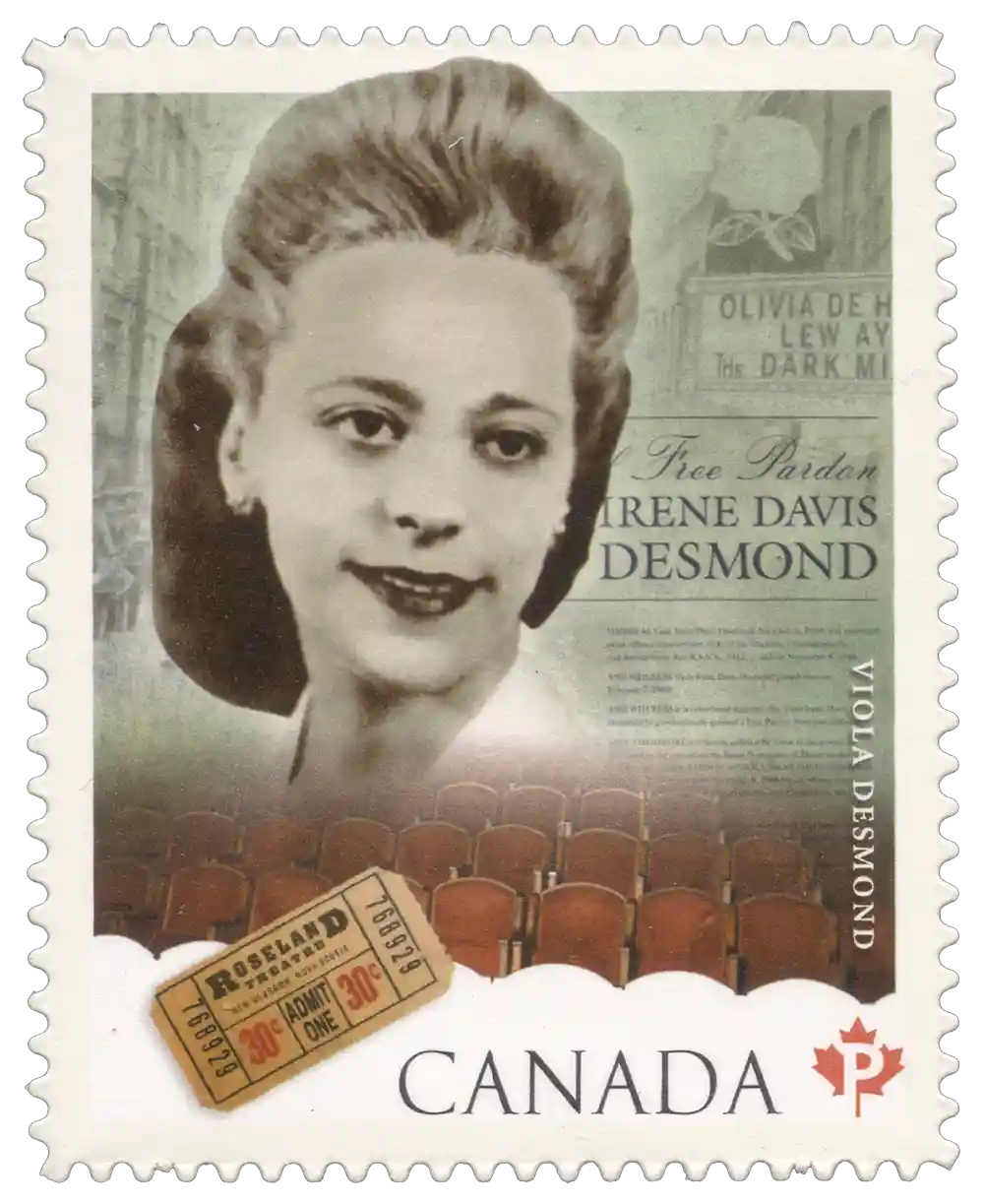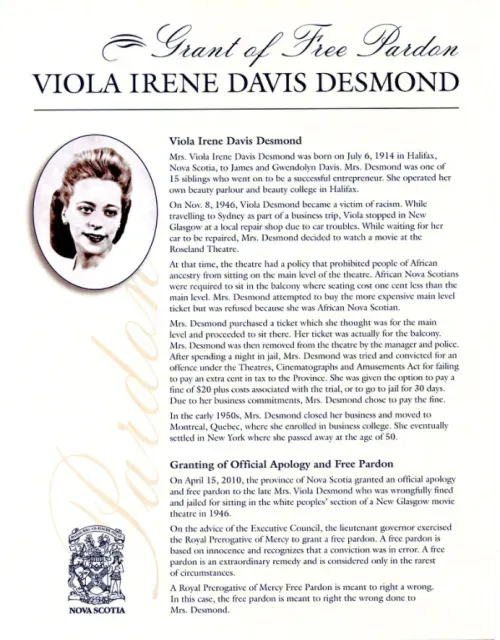Viola Irene Desmond was born on July 6, 1914, in Halifax, NS and died on February 7, 1965, in New York, NY. Viola Desmond built a career and business as a beautician and was a mentor to young Black women in Nova Scotia through her Desmond School of Beauty Culture. In 1946, Viola Desmond challenged racial discrimination when she refused to leave the segregated Whites-only section of the Roseland Theatre in New Glasgow, Nova Scotia. Viola Desmond was arrested, jailed overnight, and convicted without legal representation for an obscure tax offence as a result. Despite the efforts of the Nova Scotian Black community to assist her appeal, Viola Desmond was unable to remove the charges against her and went un-pardoned in her lifetime. Desmond’s courageous refusal to accept an act of racial discrimination provided inspiration to later generations of Black persons in Nova Scotia and in the rest of Canada.
Viola grew up with her grandparents who were active in the black community in Halifax, Nova Scotia, even though her mother was white and her father black, uncommon at that time. Viola's father had to work as a stevedore for number of years before he became a barber.
Growing up, Desmond noted the absence of professional hair and skin-care products for black women and set her sights on addressing this need. Being of African descent, she was not allowed to train to become a beautician in Halifax, so she left and received beautician training in Montreal, Atlantic City and one of Madam C. J. Walker's beauty schools in New York. Upon finishing her training, Desmond returned to Halifax to start her own hair salon called Vi's Studio of Beauty Culture. Her clients included Portia White and Gwen Jenkins, later the first black nurse in Nova Scotia.
In addition to the salon, Desmond opened The Desmond School of Beauty Culture so that black women would not have to travel as far as she had to receive proper training. Catering to women from Nova Scotia, New Brunswick and Quebec, the school operated using a vertical integration framework. Students were provided with the skills required to open their own businesses and provide jobs for other black women within their communities. Each year as many as fifteen women graduated from the school, all of whom had been denied admission to whites-only training schools. Desmond also started her own line of beauty products, Vi's Beauty Products, which she marketed and sold herself.
Viola Desmond was not out to make history when she tucked into the Roseland Theatre on Nov. 8, 1946—she was there to kill time. Stuck in New Glasgow, Nova Scotia, while mechanics worked to resuscitate her 1940 Dodge sedan, the 32-year-old businesswoman requested a single ticket for the 7 p.m. showing of The Dark Mirror.

Ignoring the unwritten rules in the segregated movie theatre, Desmond took a seat on the main floor. After refusing orders to relocate, she was dragged to the theatre lobby, dropped into a taxi, and taken to jail for the night. The next day she was charged with violating a provincial act for failing to pay the full amusement tax on her admission—a one-cent mix-up owing entirely to the fact the cashier had refused to sell her a “downstairs” ticket.
“The policeman grasped my shoulders, and the manager grabbed my legs, injuring my knee and hip. They carried me bodily from the theatre, out into the street,” said Desmond’s affidavit.
“I offered to pay the difference,” she later told a judge. “They would not accept it.” The court fined Desmond $26.
After the trial and encounter with the legal system of Nova Scotia, her marriage ended. Desmond closed her business and moved to Montreal where she could enroll in a business college. She eventually settled in New York City, where she died from gastrointestinal bleeding on February 7, 1965, at the age of 50. She is buried at Camp Hill Cemetery in Halifax, Nova Scotia.
Desmond is often compared to Rosa Parks (although Desmond’s act of civil disobedience preceded Parks by nine years), given they both challenged racism by refusing to vacate seats in "Whites Only" sections and contributed to the rise of the Civil Rights Movement. Despite Nova Scotia and other Canadian provinces having Jim Crow laws, for instance in education, there was no law specifically enforcing segregation in theatres.
In 2010, on behalf of the Nova Scotia government, Lieutenant-Governor Mayann Francis issued the first posthumous “Free Pardon” in Canadian history to Desmond’s family—an official apology and acknowledgement of the miscarriage of justice. “I believe she has to know that she is now free,” Francis said. That same year, the Viola Desmond Chair of Social Justice was created at Cape Breton University.

In February 2012, Canada Post used the backdrop of New Glasgow to unveil a postage stamp featuring Desmond. The stamp features the Roseland Theatre—including the marquee.
The provincial government declared the first Nova Scotia Heritage Day in her honour in February 2015. Desmond's portrait also hangs in Government House in Halifax, Nova Scotia.
In March 2018, the federal government unveiled the vertical banknote design featuring Desmond's portrait and a map of her north-end Halifax neighbourhood. The bill went into circulation in November 2018. The Canadian $10 bill was named the best in the world by The International Bank Note Society winning the coveted Bank Note of the Year Award for 2018.
In 2021, prompted by a request from Ontario high school student Varishini Deochand, the Government of Nova Scotia offered a symbolic repayment of Desmond's original court fees to her only surviving family member, Robson. When Robson said she would use the money to make a one-time donation for a scholarship at Cape Breton University, the Province increased the repayment from the current valuation of $368.29 to $1,000. The province also issued a commemorative cheque to display in its legislature. Original court costs were $26.
Desmond’s sister Wanda Robson still lives in Nova Scotia. Like many Canadians, she has been inspired by her sister’s story. At 73, she went back to school, finished her Bachelor of Arts degree, and now speaks to youth about her sister’s story and combating racism. Robson knows if we are to end racism and discrimination, we all need to take a stand, just as Viola Desmond did.